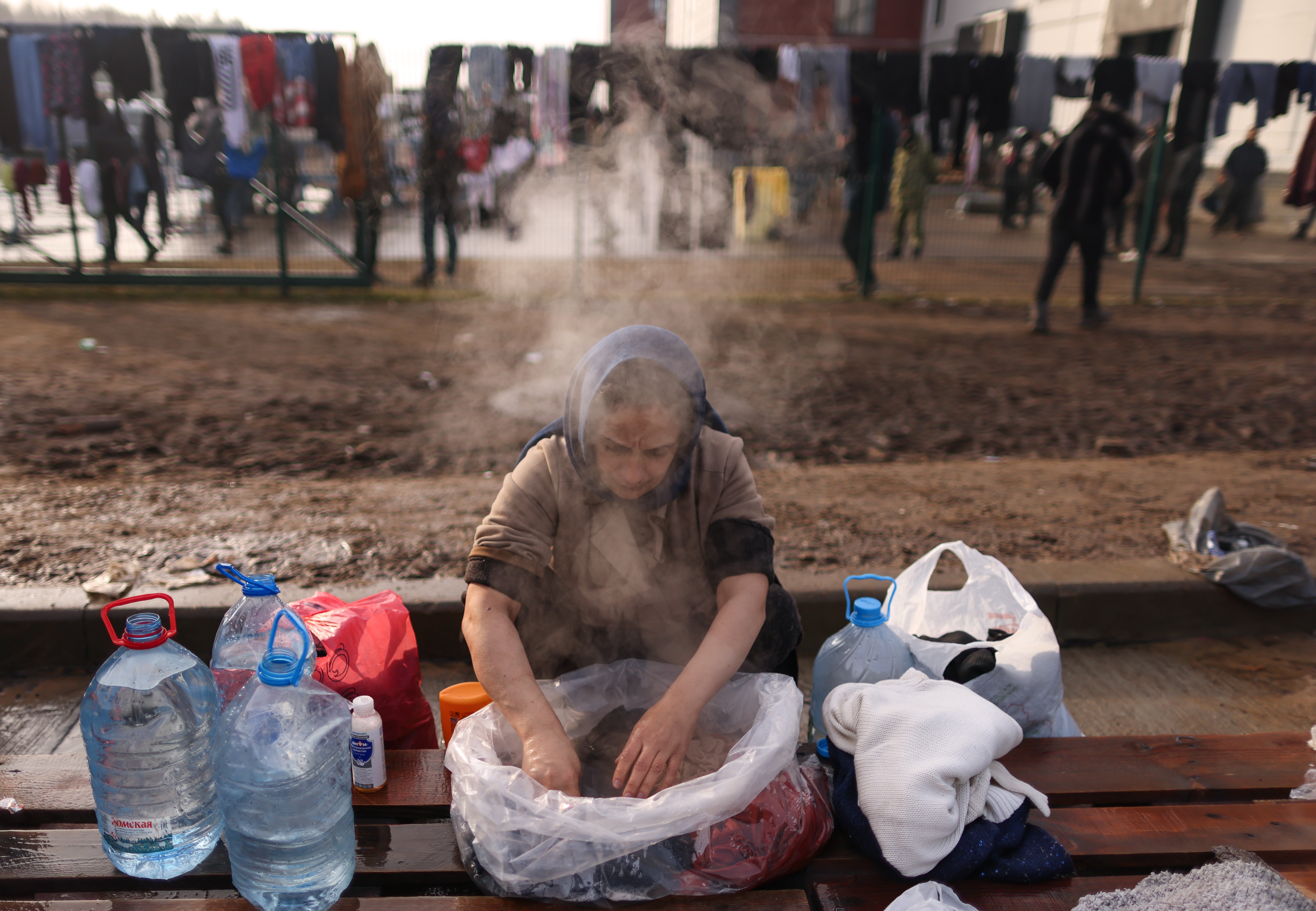Polish government’s security gamble over border migrant crisis fails to pay off in polls
Opinion polls show PiS approval falling despite a successful anti-Lukashenko stance during the Belarus border crisis, and it may prove difficult to win back supporters, reports Ahmed Aboudouh


Poland has recently become Europe’s frontline in standing up to Belarus, with the US, the EU and the UK rallying behind it. For the ruling Law and Justice party (PiS) leaders, this is the best international approval they could ever achieve.
The party’s leaders have been one of Europe’s political vagabonds since they came to power in 2015 as their right-wing views of migrants unsettled Brussels, but the recent crisis on its Belarus border provided an opportunity to change that.
PiS has long relied on portraying migrants as a threat to rally its conservative voters, a trend that continued up to the recent gridlock triggered by Belarusian President Alexander Lukashenko’s plan to herd thousands of refugees to pressure the EU.
However, this time, a small, pragmatic twist in the party’s rhetoric, and a changing political landscape across Europe, were enough to shift for PiS to shift its standpoint and make national security its dominant domestic message during the crisis.
“The PiS government has certainly taken advantage of the crisis on the Polish-Belarusian border by pointing successively to Belarus and then Russia as countries that threaten us,” Sławomir Łodziński, professor of sociology and migration studies at the University of Warsaw, told The Independent.
The party used the crisis to paint Poland as a victim of a “hybrid warfare” waged by Belarus and Russia, and did not demonise those trapped at the border, who, on many previous occasions, they called “terrorists”. The government, instead, published gloomy videos of the conditions faced by refugees on the border on social media and launched a dedicated website to fight “disinformation” by Belarus.
Lukashenko’s threats that “war is unavoidable” were used carefully by Polish Prime Minister Mateusz Morawiecki to win international backing. PiS’s anti-migrant hyperbole was channelled into an anti-Lukashenko agenda.
“There was a shift from anti-migrant to anti-Lukashenko speech because PiS understood it’d rally domestic support and would be more acceptable abroad,” Sergiusz Trzeciak, a political scientist who focuses on PR and Public policy, said.

European Commission chief Ursula von der Leyen described Lukashenko’s policies as an attempt to use migrants to destabilise the EU, and outgoing German Chancellor Angela Merkel and French President Emmanuel Macron expressed their solidarity with Poland.
The US has signed a deal to deliver hundreds of armoured vehicles to Warsaw by 2022 as part of a wider Nato support. The UK has sent military engineers to help the Polish military bolster defences at the border. British PM Boris Johnson announced that the UK was “standing shoulder to shoulder with Poland” against Belarus.
Besides the unprecedented solidarity on the international stage, the government also used the crisis to corner Poland’s biggest opposition party, Civic Platform, led by ex-president of the European Council Donald Tusk. By making it about national security, it deprived Tusk’s party of much chance to criticise the government.
“The opposition found themselves in a very difficult position as they could not attack the anti-Lukashenko strategy,” Trzeciak said.
But despite the change in stance, recent opinion polls have shown that any PiS popularity on the back of the crisis is beginning to fade away.
An opinion poll on Saturday by Estymator showed that its approval rating from voters fell to 35 per cent. The party and its right-wing allies currently hold 198 out of the 460 seats in Sejm, the lower parliament chamber.
The poll projected that if elections were held tomorrow, the right-wing coalition would be in first place but would not be able to secure a majority in parliament.
Tusk’s opposition coalition, which includes several left and centre parties, would be able to build a majority of 231 seats, according to the same polls.
“After a short period of time, PiS did not manage to gain more support and go beyond its traditional electorate, and now they are losing,” Łodziński said.
Despite its widely-perceived position as the guardian of both Polish and European territories during the crisis, PiS still faced extensive criticism. An initial ban on reporting from the border, the intimidation of journalists, and videos showing Polish soldiers attack migrants did not play well domestically.
“Although PiS was initially supported by the protection of borders and the country’s security, unlike during the 2015 migration crisis, society and the Catholic Church appalled the humanitarian aspect in the crisis at the border,” Łodziński added.
Behind it all, the ongoing row between PiS and Brussels over the rule of law, due to the Polish government’s plans to overhaul the judiciary, continues.
While reaffirming his solidarity with Poland during Morawiecki’s Paris visit last week, Macron reiterated concerns over the rule of law and “called on the Polish government to find a solution that safeguards the core values of the European Union”.
Ursula von der Leyen pledged in October to “use all the powers” at her disposal to enforce EU laws after Poland’s highest court ruled that parts of the bloc’s treaties were unconstitutional.

The Polish government’s strategy hoped to link the migrant crisis and the rule of law issue in a desperate ditch to reset the relations with Brussels. The thought was met with a veto by EU leaders who want to deal with both issues separately.
“The PiS are trying to use their success in protecting the border as a bargaining chip by putting the two issues together on the table. But I don’t see a change in the EU’s approach anytime soon,” Trzeciak said.
The PiS, however, sees domestic politics as its real weakness before the 2023 general election.
“For the ruling party, it is easier to restore domestic support than to gain a long-term backing from the EU. And this is much more important for them,” he said.
PiS hoped to capitalise on the crisis to find support beyond its traditional conservative voters. But with failing public support and increasing divergence in their views with a wary Brussels, it remains an elusive target to achieve.






Join our commenting forum
Join thought-provoking conversations, follow other Independent readers and see their replies
Comments